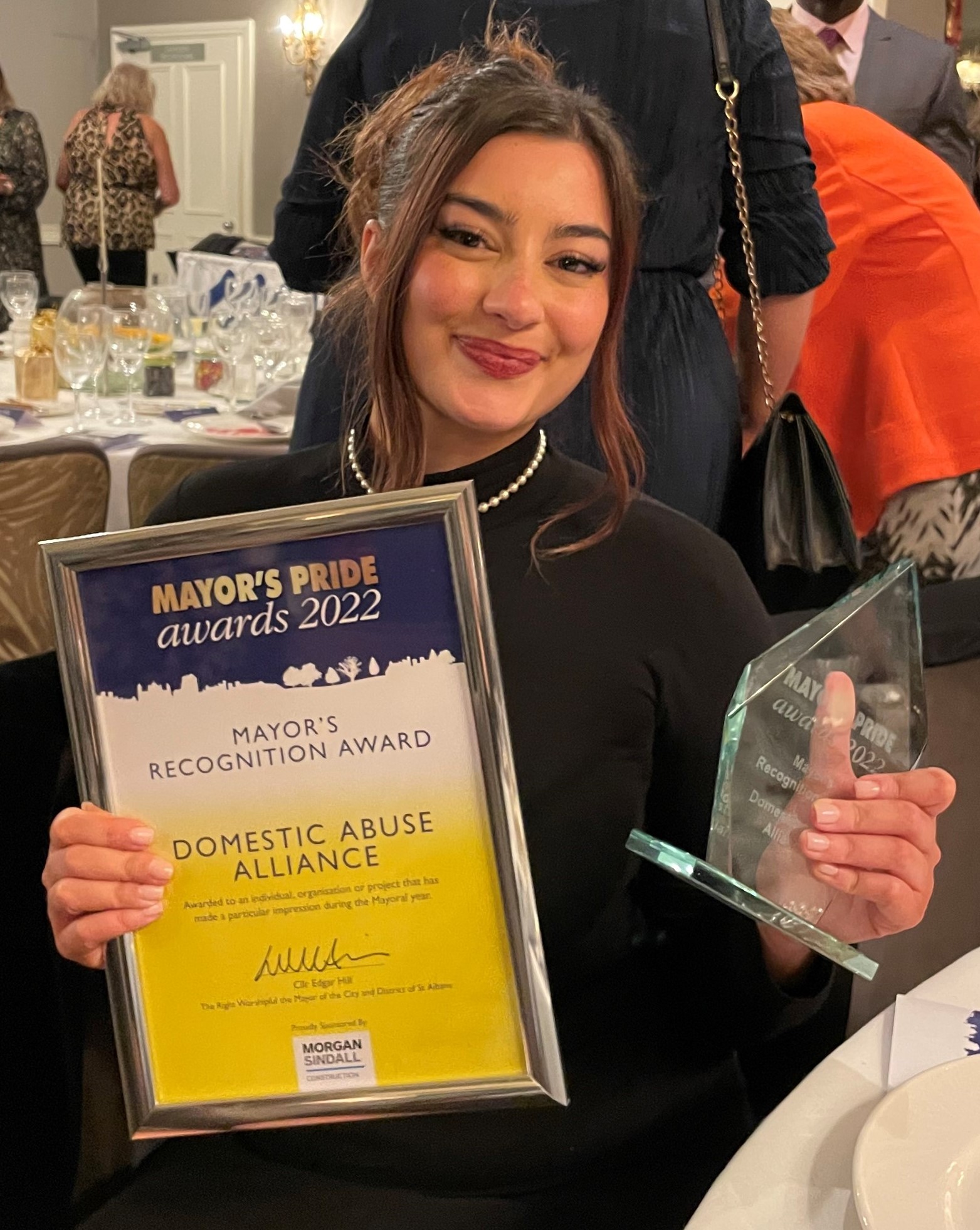Maysa Hasan is a Domestic Abuse Legal Advisor. Here she shares more about what her work entails and the support she provides to people experiencing abuse who are referred to our service.
“My role at the DA Alliance is to manage our team of call handlers and caseworkers and ensure they are providing the best legal advice to the people who are referred into us. I also advise clients directly on their legal rights and whether they are likely to be able to obtain a protective court order (such as a non-molestation order or occupation order).
“My day usually starts by responding to emails from applicants or referral partners. I will then check over any statements the team has prepared, before they are submitted to family court and assist with any legal aid or pro bono assessments that need to be completed for applicants.
“I spend a lot of time each day talking to applicants about the legal process and helping to ease any concerns they may have with taking legal action. I try to reassure applicants that the process is not as daunting as it may seems. Sometimes an applicant may not be able to secure an injunction and in those cases I will refer them to the appropriate service for emotional support if they would like it. Abuse can really affect the person’s mental health. It’s essential that they know that the abuse is not their fault. I speak to many people who have not recognised that they have been suffering abuse. They may have been abused emotionally or psychologically – abuse doesn’t always leave a physical mark. That’s why more needs to be done to raise awareness of abuse and what signs to look out for – to help prevent it, and even after it has started.
“On some occasions, applicants may have been made homeless due to the abuse they have suffered, or they are trying to escape their home. In those cases I will refer them to the relevant organisation to help them obtain secure housing. Depending on the circumstances surrounding the case, I may offer to prepare and issue a warning letter. This clearly communicates to the perpetrator that their actions are not acceptable and must cease immediately otherwise further action may be taken.
“I started working with the DA Alliance because I wanted to pursue a career in family law. I had completed my bachelor’s degree (LLB honours) a year prior to entering my role as a domestic abuse legal advisor. I am currently studying part-time on a SQE training course to complete my final exams as a solicitor, before I start a training contract. All of the team share a professional or personal passion for helping people escape domestic abuse. We provide anyone experiencing abuse with the information and support they need to help break the cycle.
“The way we communicate with applicants is critical to whether or not they decide to engage with the legal process. We have received specialist training from SafeLives to help us understand the barriers for survivors in disclosing domestic abuse and engaging with support services. This has also equipped us with practical, survivor-centred tools and strategies for engaging people to access support. Using ‘soft’ communications skills i.e. avoiding legal jargon and speaking in survivor-centric language is also part of our training, to help survivors navigate the legal and court process.
“The most rewarding aspect of my role is helping to secure legal protection for applicants, so they no longer have to live in fear. Their relief is worth all of the hard work that comes with this role.
“The biggest challenge is when I have to tell people that they are unlikely to secure legal protection. This could be due to a number of reasons, but in order to secure a protective order, usually there has to have been a recent incident of abuse. Many people are too scared to come forward immediately and disclose abuse, or they have needed to start processing what has happened to them first, before seeking support. Once they do feel ready to proceed, an extended period of time might have passed and they may not be able to secure a protective order through the court. In those instances, a client can feel like they have re-lived the incident for no reason. It’s our job to reassure them that reporting the abuse was the right thing to do. We always encourage applicants to contact us again if there are further incidents of abuse so we can try to secure legal protection for them.
“The single piece of advice I would give to anyone working in this sector is to know your limits. We hear first-hand, accounts of severe abuse and trauma. Our clients have already been through so much before they have even been referred to our service. They may be frustrated, scared, and angry and often feel alone. Even though we are equipped with self-care tools and strategies to help us manage the personal impact of our work, you can’t help but absorb some of it and take it home with you. It’s challenging but it’s what drives us to help make someone experiencing abuse feel safe again.”






